Discover the Best Board Games for Every Player
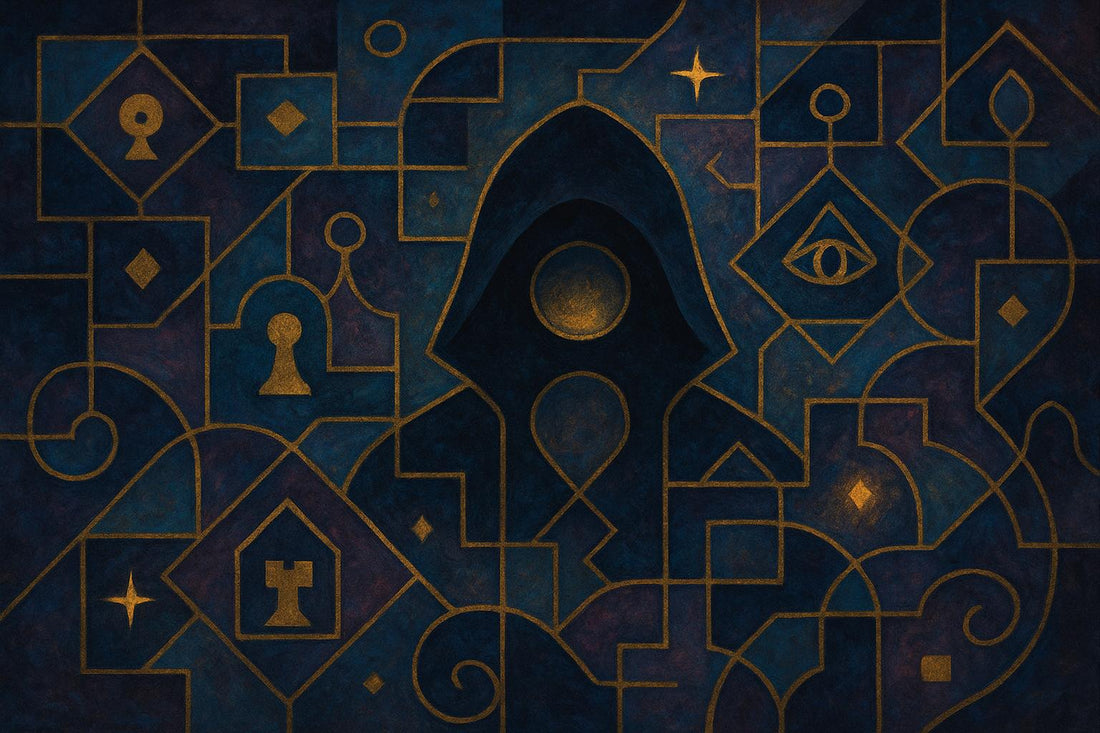
Best Games with Secret Roles
Secret role games are perfect for adding mystery and excitement to your game nights. These games revolve around hidden identities, social deduction, and strategic bluffing, creating thrilling moments of deception and discovery. Whether you're a fan of quick rounds or immersive storytelling, there's a game for every group size and preference.
Key Highlights:
- Hidden Roles: Players have secret identities or objectives, fueling tension and intrigue.
- Social Deduction: Use logic, observation, and questioning to uncover the truth.
- Bluffing: Deception is often necessary to win.
- Themes and Variety: From spies to werewolves to fantasy witches, there's a theme for everyone.
- Player Count: Games range from small groups (2–6 players) to larger gatherings (up to 20 players).
- Playtime: Options for quick 10-minute rounds or longer, immersive sessions.
Popular Picks:
- The Resistance: Spy vs. freedom fighters in a 30-minute game for 5–10 players.
- Blood on the Clocktower: A rich storytelling experience for 7–20 players.
- Coup: A fast-paced bluffing game for 2–6 players.
- One Night Ultimate Werewolf: Quick deduction rounds for 3–10 players.
- Spyfall: Humor-filled questioning for 3–8 players.
Quick Comparison:
| Game | Player Count | Playtime | Complexity | Best For |
|---|---|---|---|---|
| The Resistance | 5–10 | 30 min | Medium | Larger groups, easy to learn |
| Blood on the Clocktower | 8–20 | 60–120 min | High | Immersive storytelling |
| One Night Ultimate Werewolf | 3–10 | 10–15 min | Low | Quick games, beginners |
| Coup | 2–6 | 15–30 min | Medium | Fans of bluffing |
| Spyfall | 3–8 | 15–30 min | Low | Casual, humorous play |
These games are perfect for creating unforgettable moments of tension, laughter, and surprise. Whether you're a beginner or a seasoned strategist, there's a secret role game to match your vibe.
Top 10 Hidden Role Games
What Makes a Good Secret Role Game
Secret role games have a knack for turning ordinary game nights into thrilling, strategic showdowns where every word, gesture, and glance can shift the balance. Understanding what sets the best secret role games apart can help you pick ones that your group will want to play again and again.
Core Game Elements
At the heart of every great secret role game are hidden identities. Players are assigned secret roles that define their objectives, alliances, and paths to victory. This creates an immediate imbalance of information - everyone knows something others don’t - which fuels the tension and intrigue that drive the game forward.
Social deduction mechanics are another key ingredient. The best games offer multiple ways to piece together clues about others’ roles, whether through voting patterns, subtle behaviors, or strategic decisions. However, they strike a delicate balance - making the solution neither too obvious nor impossibly elusive.
Meaningful bluffing is where the magic really happens. Players must mislead and deceive, whether to protect their identities or to cast suspicion on others. In the most engaging games, deception isn’t just an option - it’s a necessity.
Finally, balanced team dynamics are crucial. Whether you’re on the “good” team or the “bad” team, both sides should feel like they have a fair shot at winning. Games that overly favor one side can lead to frustration and hurt replayability. The best experiences come when victory hinges on skill and strategy rather than sheer luck. These elements work together to create the nail-biting tension that defines secret role games.
Why Players Enjoy These Games
What makes these games so captivating is how they tap into human psychology. Instead of focusing solely on rules or strategies, they emphasize reading other players - their actions, motivations, and intentions.
The social conflict and creeping paranoia they foster create an addictive cycle of gameplay. Every interaction feels loaded with meaning, as players second-guess every word and action from their friends. Suddenly, familiar faces seem like potential threats.
Another layer of complexity comes from the shifting trust dynamics. These games often lead to unforgettable moments - whether it’s a brilliant deception, a shocking betrayal, or an unexpected triumph. Players help shape the story, creating memories that stick long after the game ends.
"The best stories in TTRPGs aren't the product of a sequence of well-designed beats. They're the product of dilemmas. Tension. Conflicts whose resolution is unclear and whose cost isn't easy." – Serban Ionita
Before diving into a game, though, it’s worth considering a few factors that can make or break the experience.
Things to Consider Before Playing
A few practical considerations can help ensure your group has a great time:
- Player count requirements: Secret role games often rely on having the right number of players. Too few, and roles become too easy to figure out. Too many, and individual influence can get lost. Check the game’s recommended range to see if it fits your group size.
- Accessibility and learning curve: Games with simple rules are easier for new players to jump into, but they might not offer enough depth for seasoned players. Meanwhile, more complex games can be overwhelming for beginners. Striking the right balance is key.
- Theme resonance: The theme of the game can make a big difference in how much your group enjoys it. Whether it’s vampires, space exploration, or medieval court intrigue, picking a theme that excites your group can elevate the experience.
10 Best Secret Role Games
If you love the thrill of hidden identities and social deduction, these ten games are sure to make your game nights unforgettable. Each one brings something special to the table, whether it's clever bluffing, strategic deduction, or intense social dynamics.
The Resistance
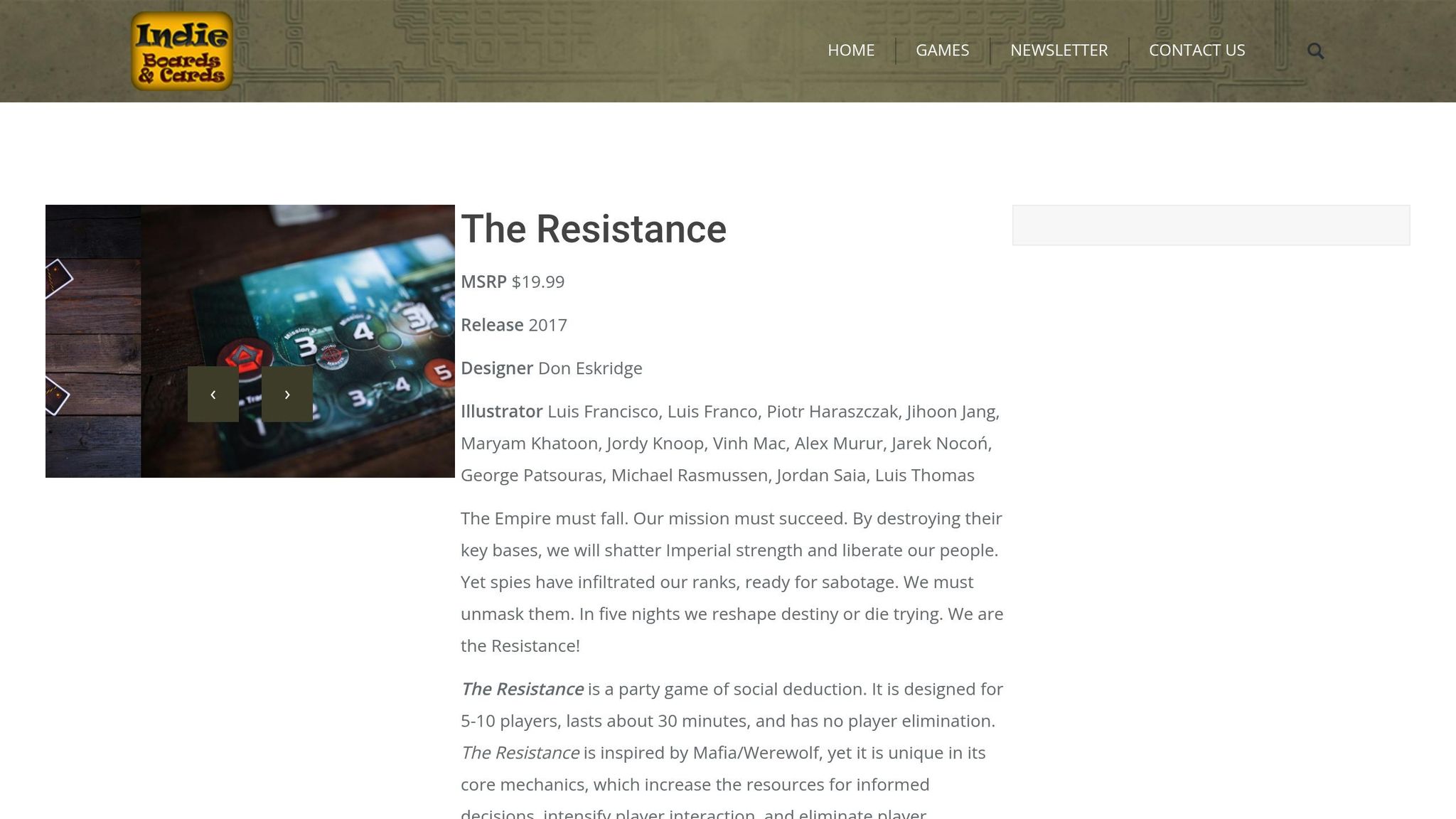
In The Resistance, you and your friends take on the roles of freedom fighters trying to overthrow a corrupt government. But beware - spies are hidden among you, working to sabotage your missions. With no player eliminations, everyone stays involved as the resistance tries to complete three successful missions while the spies aim to disrupt them. Perfect for 5–10 players, this 30-minute game keeps the tension high from start to finish.
Discover The Resistance at Brain Games
Blood on the Clocktower
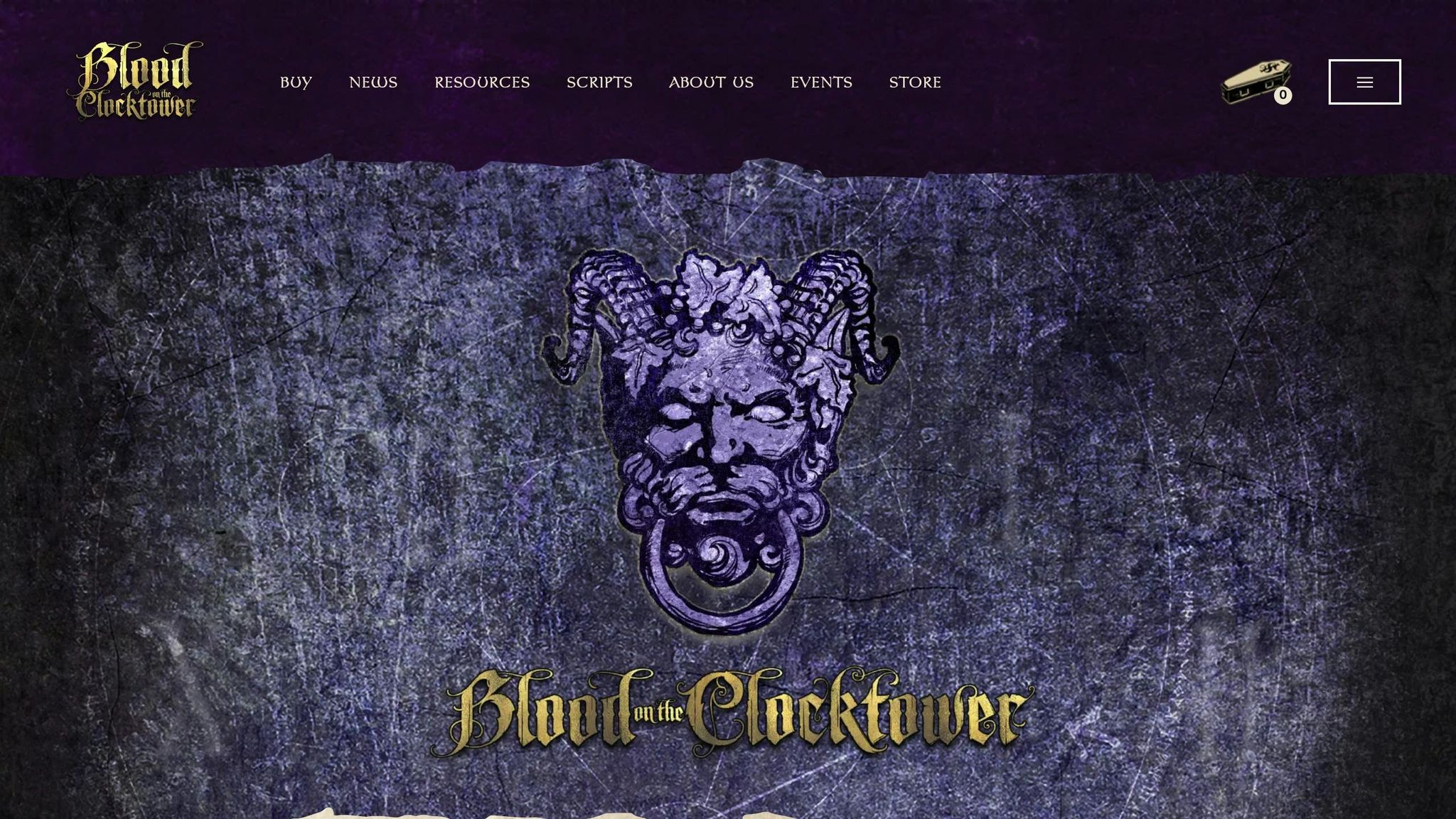
Blood on the Clocktower takes secret role games to another level with its rich storytelling and immersive gameplay. Guided by a Storyteller, players assume roles in a medieval village plagued by demons. Even if you're eliminated, you can still participate as a ghost and influence the game. With a variety of scripts and characters, this game works for groups of 7–20 players and offers endless replay possibilities.
Discover Blood on the Clocktower at Brain Games
One Night Ultimate Werewolf
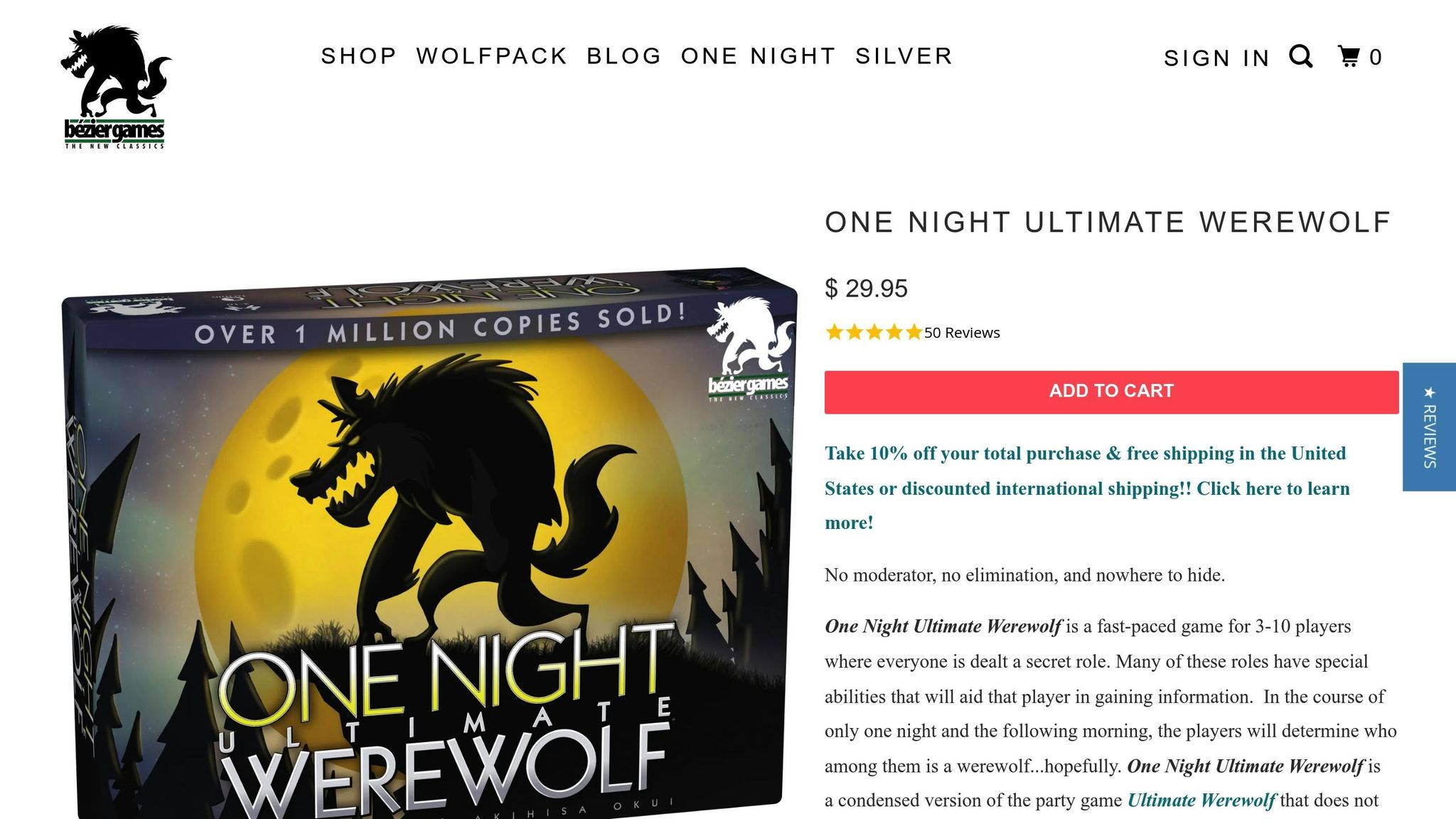
One Night Ultimate Werewolf is a fast-paced take on the classic werewolf game. Designed for 3–10 players, it packs all the fun into just 10–15 minutes. Each player gets a secret role, and a smartphone app guides the night phase as roles take action. The twist? Roles can switch during the game, so you might not be who you think you are by the end.
Discover One Night Ultimate Werewolf at Brain Games
Coup
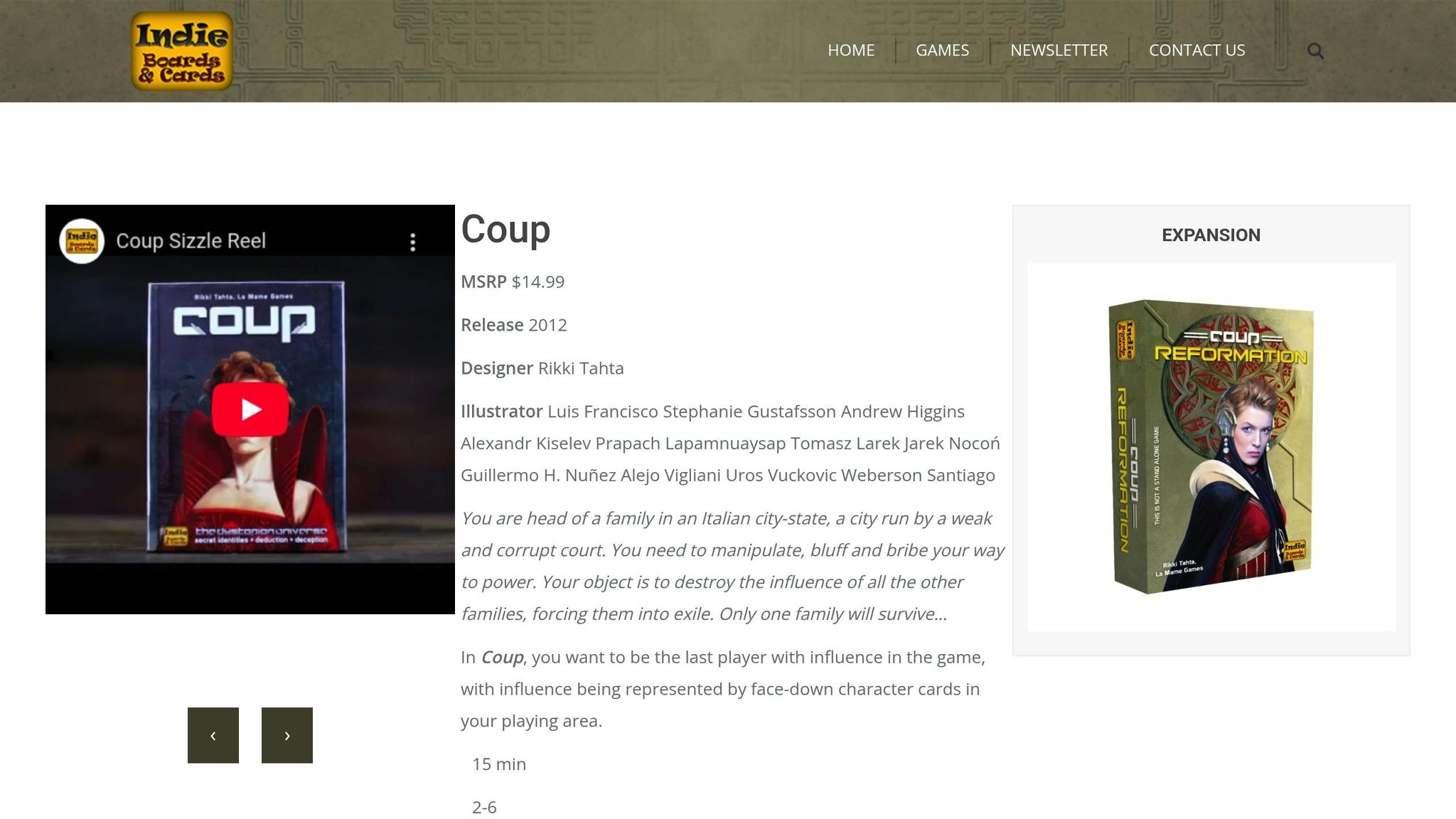
Coup strips bluffing down to its core in a dystopian world of political intrigue. Each player controls two character cards and two coins, using strategy and deception to eliminate opponents. The game’s claim-based mechanics let you assert any character’s ability, but beware - if someone challenges your bluff and you’re caught, you lose a card. Quick and intense, Coup is ideal for 2–6 players and typically lasts 15–30 minutes.
Spyfall
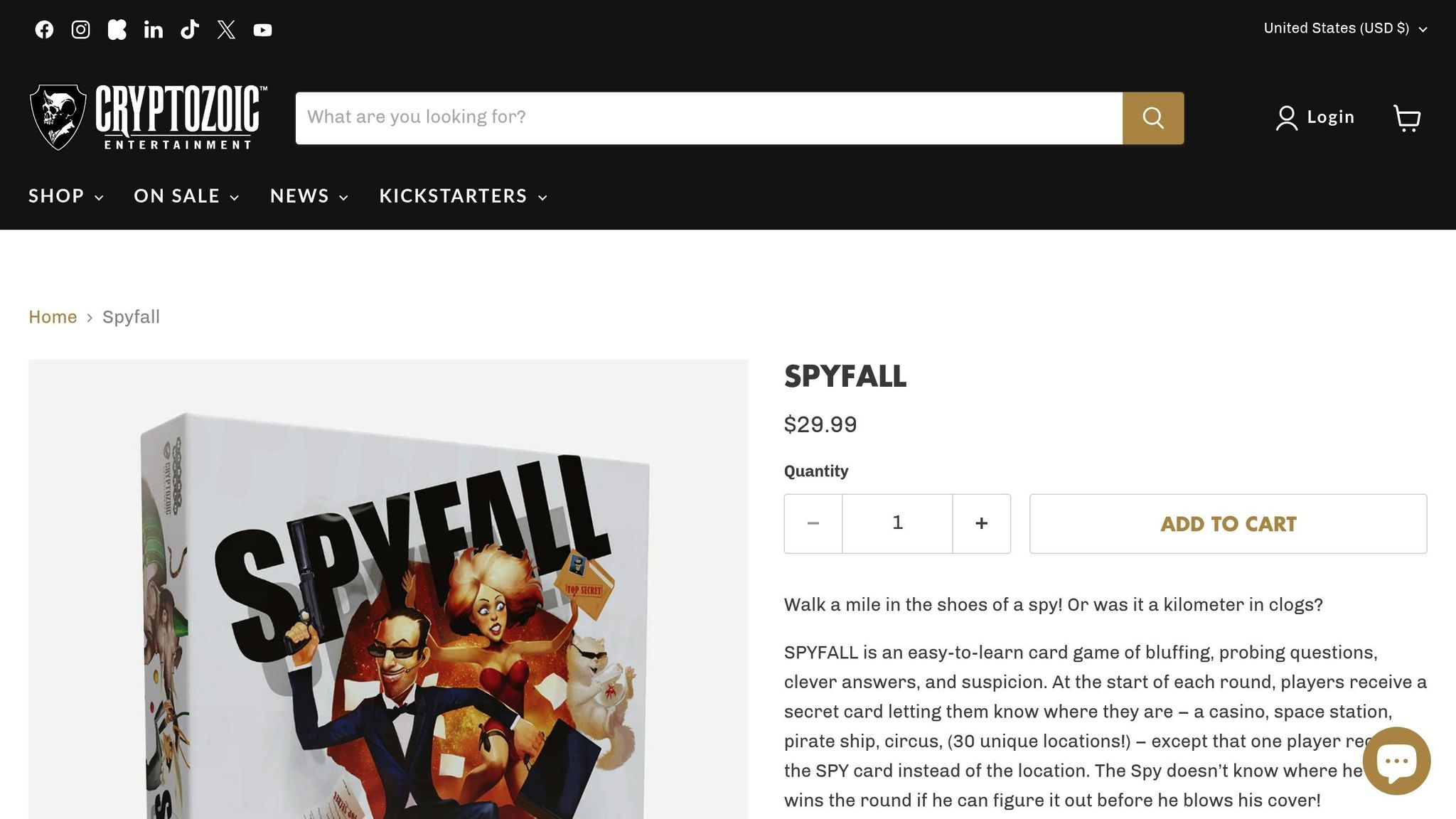
In Spyfall, one player is the spy, while everyone else knows the secret location. Players ask each other questions to confirm their knowledge of the setting, while the spy tries to figure it out without blowing their cover. With its mix of humor and suspense, Spyfall is great for 3–8 players and guarantees plenty of laughs.
Discover Spyfall at Brain Games
Inside Job
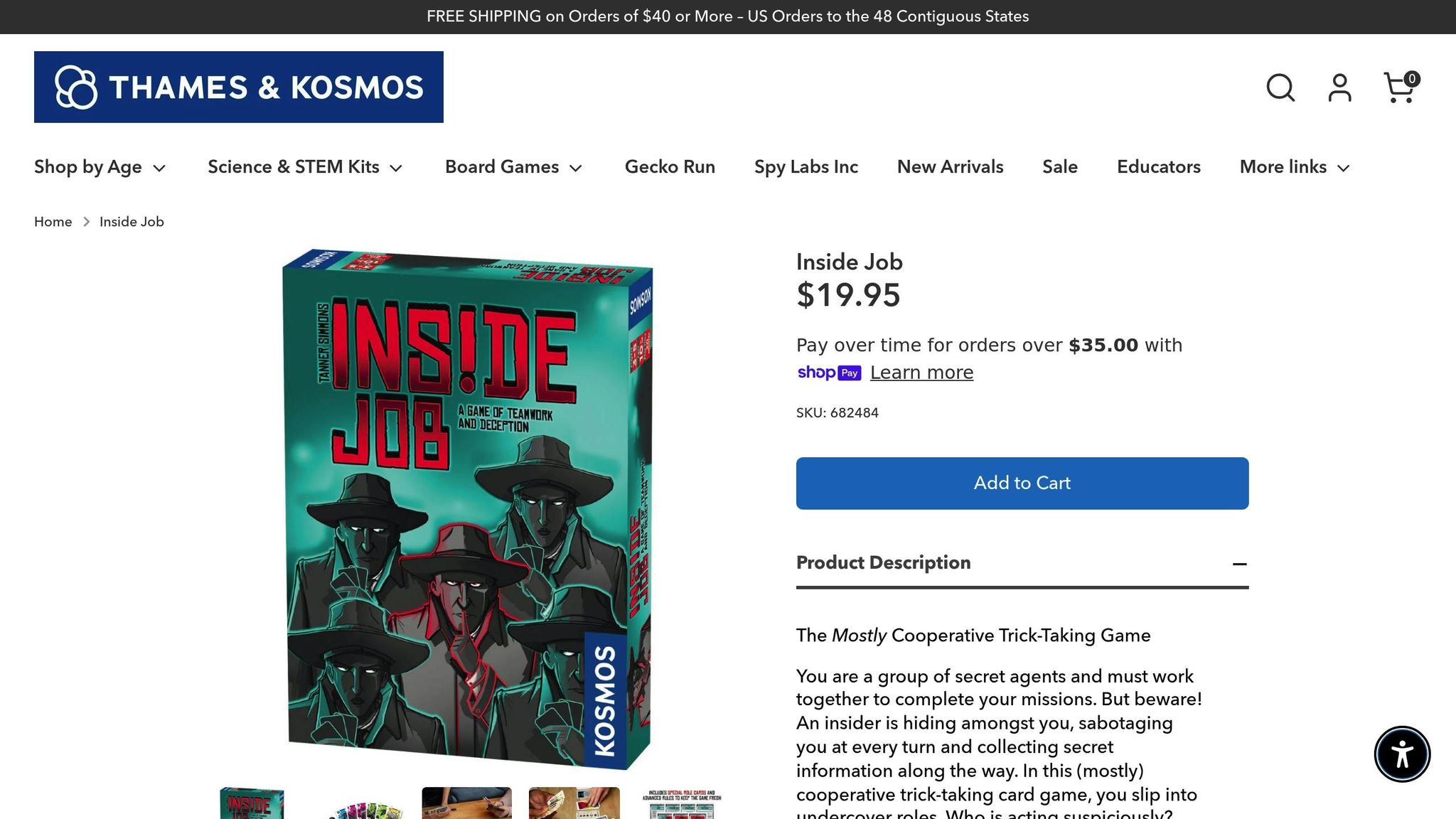
Inside Job combines teamwork with a hidden traitor element. Players collaborate to pull off a heist, but one of them is secretly working for the corporation they’re targeting. The mix of cooperation and betrayal creates a tense, paranoia-filled atmosphere, making it an engaging choice for game night.
Discover Inside Job at Brain Games
Specter Ops

Specter Ops brings stealth and strategy together in a high-tech setting. One player is a secret agent sneaking through a facility, while the others play hunters trying to track them down. The agent’s movements are hidden, creating a thrilling game of cat and mouse. With its sci-fi theme and varied scenarios, this game immerses players in a world of espionage.
Discover Specter Ops at Brain Games
Cthulhu in the House
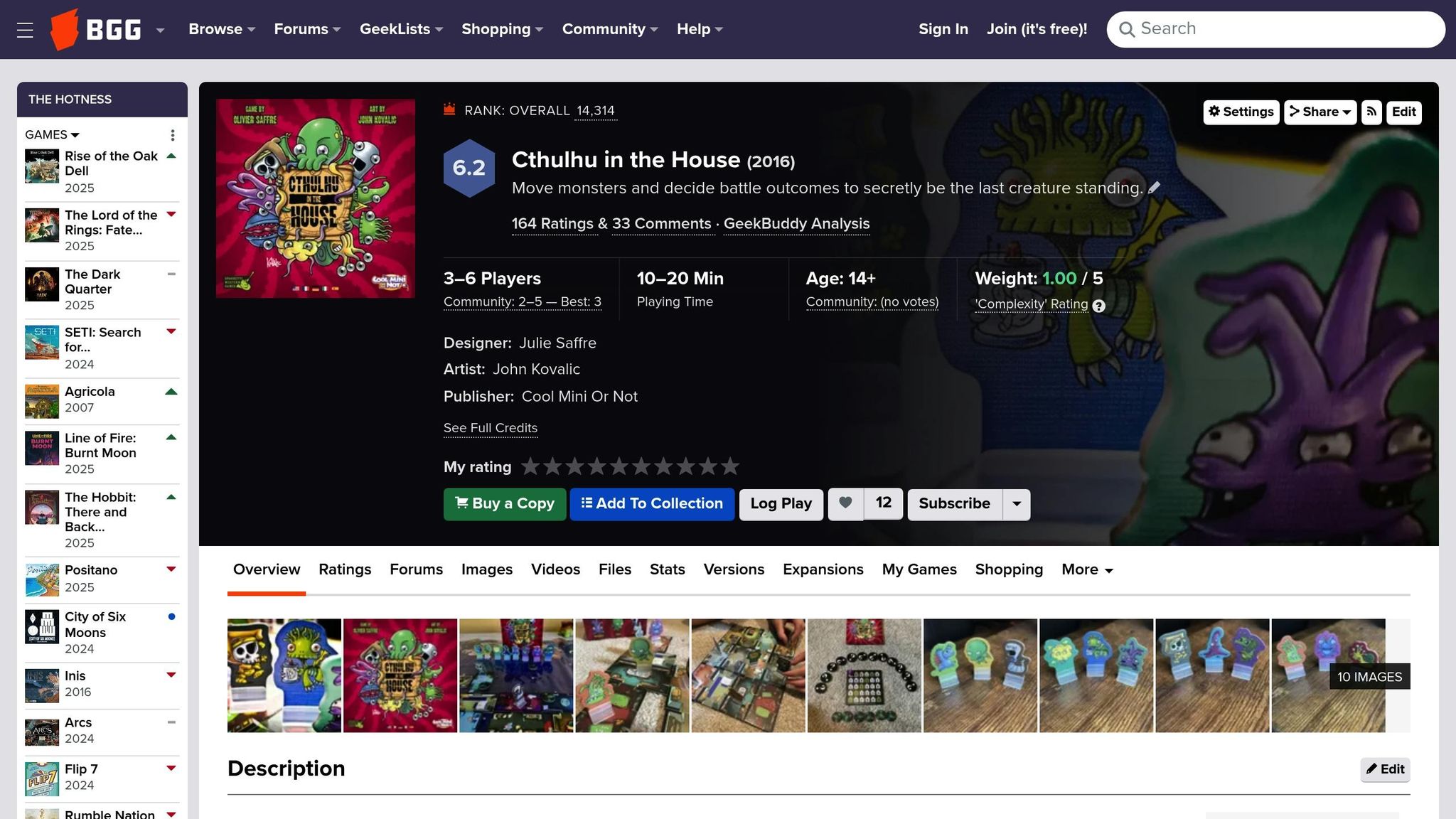
Lovecraftian horror meets humor in Cthulhu in the House. Players are students at Miskatonic University, but some have fallen under the influence of the Old Ones. Sane students aim to graduate, while others work to summon Cthulhu. With shifting alliances and multiple win conditions, this game keeps everyone guessing until the very end.
Discover Cthulhu in the House at Brain Games
The Chameleon

In The Chameleon, one player is the odd one out, unaware of the secret topic everyone else knows. Players give one-word clues to hint at the topic, while the Chameleon tries to blend in and guess it. This clever game of deduction and deception is highly rated and available for $19.99.
Discover The Chameleon at Brain Games
Curses and Covens
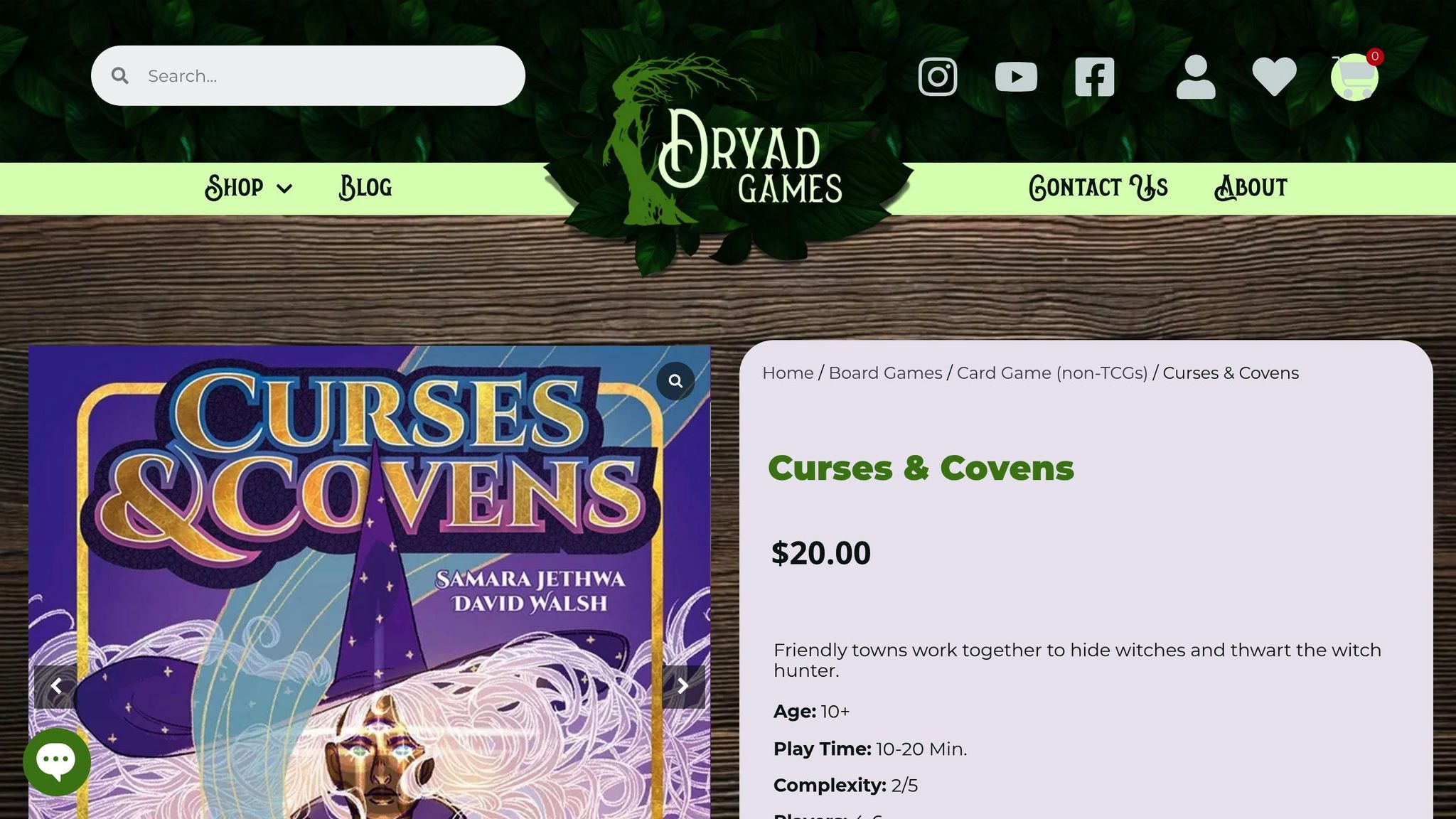
Curses and Covens immerses players in a magical world of witches with hidden agendas. Some players form covens, while others pursue their own goals. With spell-casting mechanics and constantly shifting alliances, this game is as enchanting as it is unpredictable. The detailed artwork and components add to the mystical experience.
Discover Curses and Covens at Brain Games
sbb-itb-1ed942f
Game Comparison Guide
Picking the right secret role game can make or break your game night. Whether you're after intense strategy, quick laughs, or immersive storytelling, each game brings something unique to the table. This guide breaks down key elements like player count, playtime, and interaction styles to help you find the perfect fit for your group.
Comparison Table
| Game | Player Count | Playtime | Complexity | Best For | Player Interaction |
|---|---|---|---|---|---|
| The Resistance | 5–10 | 30 min | Medium | Larger groups seeking easy entry | High – constant discussion and voting |
| Blood on the Clocktower | 8–20 | 60–120 min | High | Deep, immersive gameplay | Very High – active engagement, even after elimination |
| One Night Ultimate Werewolf | 3–10 | 10–15 min | Low | Quick games and beginners | Medium – focused discussion phase |
| Coup | 2–6 | 15–30 min | Medium | Fans of bluffing and strategy | High – direct challenges and confrontations |
| Spyfall | 3–8 | 15–30 min | Low | Casual groups and humor seekers | Medium – question-based deduction |
| Inside Job | 3–8 | 45–60 min | Medium | Cooperative play with a twist | High – teamwork laced with betrayal |
| Specter Ops | 2–5 | 60–90 min | High | Strategy fans and asymmetric roles | Medium – limited direct interaction |
| Cthulhu in the House | 4–8 | 60–90 min | Medium | Horror enthusiasts | High – shifting alliances and varied win conditions |
| The Chameleon | 3–8 | 15–20 min | Low | Word game lovers | Medium – clue-giving and deduction |
| Curses and Covens | 4–8 | 45–75 min | Medium | Fantasy fans | High – spellcasting and alliance building |
Choosing the Right Game
Player Count: The size of your group matters. If you're hosting a larger gathering, games like The Resistance or Blood on the Clocktower thrive with more players, though the latter requires someone to manage the Storyteller role. On the flip side, smaller groups might prefer the strategic depth of Coup or the asymmetric gameplay of Specter Ops.
Playtime: How much time you have can also shape your choice. If you want quick rounds with lots of variety, One Night Ultimate Werewolf is ideal. For those ready to dive into a lengthier, centerpiece experience, Blood on the Clocktower offers a rich, immersive session.
Interaction Style: The way players interact can define the vibe of the game. Coup brings direct confrontations and bluffing into the spotlight, while Spyfall revolves around subtle questioning. Games like The Resistance mix team-based discussions with individual suspicions, creating a balance of cooperation and deceit.
Elimination Mechanics: Some games handle elimination differently, which affects player engagement. For instance, Blood on the Clocktower keeps eliminated players involved as ghosts, while One Night Ultimate Werewolf avoids elimination entirely by wrapping everything into a single, fast-paced round.
Themes: The theme can make a game even more enjoyable for your group. Horror lovers might lean toward Cthulhu in the House, while fans of wordplay could gravitate to the lighthearted fun of The Chameleon. If political intrigue and strategy are more your group's speed, The Resistance delivers a tense and engaging experience.
How to Host a Great Secret Role Game Night
Hosting a secret role game night goes beyond simply picking a fun game. With the right planning, atmosphere, and attention to detail, you can turn a casual gathering into an unforgettable evening filled with suspense, laughter, and camaraderie.
Setting Up Your Group
The success of your game night starts with the guest list. Invite people well in advance to ensure you have the right number of players for your chosen game. Some secret role games thrive with larger groups, while others are better suited for a smaller, more intimate setting. To avoid last-minute indecision, decide on a game (or a shortlist of two or three) ahead of time and let your guests know what to expect. This way, everyone arrives prepared and ready to dive in.
If hosting feels overwhelming, consider organizing a potluck. Sharing the responsibility for snacks and drinks keeps the evening relaxed and ensures there’s plenty of fuel for the fun.
Creating the Right Atmosphere
The setting plays a huge role in making the night memorable. Adjusting your space to match the theme of the game can elevate the experience. Dim the lights, add themed decorations, and play subtle background music to create an immersive environment. A clutter-free play area helps keep everyone focused on the game.
For an extra layer of fun, encourage guests to dress in theme or wear specific colors that tie into the game. These small details can make the night feel even more special and engaging.
Managing Gameplay
As the host, your role doesn’t stop once the game begins. Start the evening with a little social time to help everyone settle in, then transition smoothly into the game by explaining the rules and roles clearly. Keep the energy up by guiding discussions and ensuring the game maintains a good pace. If you have new players, offer a quick overview of their roles before starting, but let them discover the nuances of gameplay on their own - half the fun is in figuring things out.
Be flexible and ready to adapt to the group’s mood. If the energy dips or interest wanes, have a backup game ready to keep the night lively. The goal is to keep the excitement and engagement high throughout the evening.
"My biggest advice is, it doesn't have to be a big to-do or something to stress about. Game nights are supposed to be super casual and a fun way to socialize and laugh until your cheeks hurt." - Chris Loves Julia
Conclusion
Secret role games bring together strategy, deception, and social interaction to transform any gathering into an unforgettable experience. They create a natural sense of tension, pushing players to question even their closest allies while sharpening skills like observation, deduction, and strategic planning.
What makes these games so engaging is their incredible variety. Whether your group prefers quick deduction rounds or longer, more strategic gameplay, there’s a secret role game out there that fits your vibe. Some focus purely on uncovering hidden roles, while others mix in challenges like completing tasks or sabotaging opponents - making it important to match the game’s complexity to your group’s preferences.
The best nights happen when everyone dives into their roles, whether they’re working for the common good or plotting in secret. The suspense, the accusations, and the dramatic reveals create moments that stick with you long after the game ends. If you're ready to add some intrigue to your next gathering, explore our range of secret role games at Brain-Games.lv/en/ and start planning your next game night!
FAQs
Why are secret role games great for boosting social interaction during game nights?
Secret role games are a perfect choice for game nights because they bring out the best in communication, teamwork, and clever strategy. The thrill of hidden roles and the art of deception push players to analyze body language, pick up on subtle clues, and decide whether to work together or go head-to-head - all while keeping everyone on their toes.
What makes these games even better is how they spark lively conversations and encourage teamwork, strengthening connections among players. The face-to-face interaction adds an irreplaceable layer of fun, making these games an ideal way to create unforgettable moments with friends and family.
What should I keep in mind when picking a secret role game for my group?
When selecting a secret role game, it's important to think about a few factors to make sure it’s a good match for your group:
- Group Size: Check that the game accommodates the number of players in your group. Some games shine in larger gatherings, while others are better suited for smaller, more intimate settings.
- Complexity and Playtime: Align the game's difficulty and length with your group’s preferences. If you’re playing with a casual crowd, a simpler, quicker game might be the best choice. For more seasoned players, something with deeper strategy or complexity could be more appealing.
- Theme and Mechanics: Choose a theme that resonates with your group - whether it’s mystery, fantasy, or horror. Also, consider the gameplay mechanics, like bluffing, deduction, or strategy, to ensure the experience is engaging.
- Replayability: Opt for games that offer variety in roles or outcomes. This keeps the game interesting, even after multiple sessions.
By keeping these points in mind, you’ll pick a game that guarantees fun and memorable moments for everyone involved!
What are some tips for hosting a fun and successful secret role game night?
To throw an unforgettable secret role game night, start by choosing games that fit the size and vibe of your group. Classics like Werewolf or One Night Ultimate Werewolf work perfectly for larger gatherings, sparking plenty of strategy and lively interaction.
Set the mood by creating a comfortable space with enough seating, good lighting, and a tidy layout for all the game pieces. Have some easy-to-grab snacks and drinks on hand, but keep them away from the playing area to avoid any accidental messes. Before diving in, take a moment to explain the rules and objectives clearly so everyone feels ready to play.
Kicking things off with a quick warm-up game can help ease everyone into the fun, and scheduling short breaks throughout the night keeps the energy buzzing. With these thoughtful touches, your game night is bound to be a crowd-pleaser!






